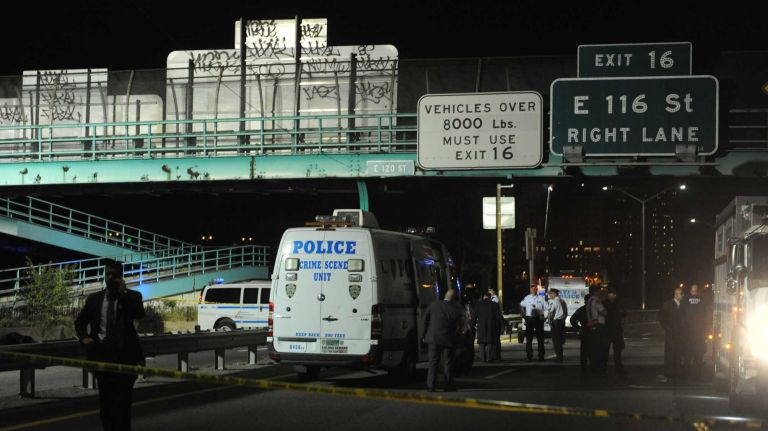
I ran over to First Avenue — in the direction of sirens and helicopters. More than 100 NYPD officers and a dozen residents stood by the foot of Willis Avenue Bridge, which had been closed off Tuesday night by cops with machine guns and barking dogs looking for a man who shot a cop.
A young woman said she heard gunshots near 104th Street, and that she saw cops detain a group of young kids only to take off after reports of a down police officer came over their radios. About a police officer being shot, she said that while she felt for the cop’s family she wasn’t really upset about it. “I don’t care about them getting shot because at the end of the day they don’t care when we get shot.”
She wasn’t, however, referring to cases of unarmed black men shot by police — though she said she was angry that many of those cops have gotten off in those cases. Instead she told me the story of a friend who was shot and paralyzed only to have police officers blame the man for walking home from work in a known drug area. That experience drives her feelings about the police.
Young people in East Harlem echoed her thoughts. They couldn’t empathize with Officer Randolph Holder, who died after being shot Tuesday, because they said empathy had not been afforded to them by police. While it might seem harsh to many, it’s a reality in a segment of the city, especially among young, poor kids living in high-crime areas. And it underscores the difficult job for 1 Police Plaza as it seeks to deepen the trust between the police and the policed.
A mile further south and an hour before Holder’s shooting, 150 NYCHA residents from the Issacs Holmes Houses marched to Gracie Mansion. They were protesting plans to privatize NYCHA property and pointed out many of the dismal conditions in which public housing residents live. They also spoke to a lack of humanity in this city — not by police but by government officials and real estate developers.
Clearly, there is widening gap among police and young people, poor people and our city government. Is it realistic to think everyone will simply “come together” when so many feel their lives matter less than others?
Acknowledging that pains exist and that many are desensitized to suffering because they feel they’ve been living a war might help us find our humanity as the city mourns another life lost.
Josmar Trujillo is a trainer, writer and activist with the Coalition to End Broken Windows.






































